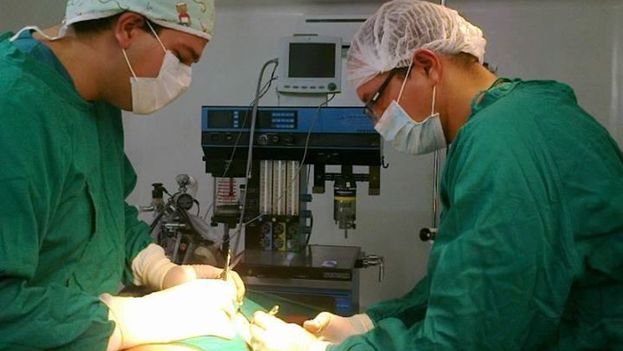
![]() 14ymedio, Havana, 2 December 2015 – “Will retired doctors be subject to the special travel regulations?” This question, asked by a commentator named Rita, led off the online forum managed by the Ministry of Public Health (MINSAP) on the digital site Cubadebate. Dozens of internauts swamped this site from 10 in the morning looking for information about one of the most unpopular measures of recent months. The rules announced this Tuesday established that, starting from next Monday, Cuban medical specialists will need authorization to travel for private purposes.
14ymedio, Havana, 2 December 2015 – “Will retired doctors be subject to the special travel regulations?” This question, asked by a commentator named Rita, led off the online forum managed by the Ministry of Public Health (MINSAP) on the digital site Cubadebate. Dozens of internauts swamped this site from 10 in the morning looking for information about one of the most unpopular measures of recent months. The rules announced this Tuesday established that, starting from next Monday, Cuban medical specialists will need authorization to travel for private purposes.
The Public Health Ministry responded at several opportunities that it is “not prohibiting [healthcare professionals] from leaving the country on personal trips or living abroad, but that, “it is trying to organize the services to guarantee quality healthcare to the population.” The agency asked for “trust, as always, in those who do what is best for everyone.” It also clarified that “this measure only includes medical specialists and final year residents in those specialties that are not specialist in comprehensive general medicine.”
Also a focus of attention of several commentators was improving salaries for medical personnel as a measure that could help much more than restricting travel. “They should make adjustments in the financial remuneration of the principal actors who make this contribution to the economy,” noted Oro22, speaking of the considerable resources received by the nation every year through the concept of medical missions abroad.
Several of the participants delved into their personal situation and their fear of having to cancel and already planned trip in the coming weeks because of not being able to obtain the permission to leave in time.
One of the most frequent questions was whether “doctors residing in Cuba who are currently working under independent contracts abroad, would have to ask permission to leave if they were to enter the country.” This reflects the growing number of healthcare professionals who are undertaking independent contracts and countries such as Ecuador, South Africa, and other nations in Africa and the Caribbean area.
“All of the doctors who left the country before this new measure do not have to ask for any kind of authorization to return,” MINSAP authorities stressed, because “they are no longer active doctors in the system so they can enter and leave without any document.”
Complaints were also directed at the quality of the forum, given that one hour after its start there were more than 100 questions and barely 3 answers, one of them repeated. One internaut criticized the schedule of the forum and asked “Who had the idea of having an online forum at a time when all of the healthcare personnel interested in the subject are busy delivering the health services so necessary to the population?”
The implementation of the new measure was questioned bluntly by many of the forum participants, as was the case with Mexico2 who inquired, “To whom can we appeal a decision that we don’t agree with? Can we go above the Minister of Health? Can we take it to the Supreme Court?”
The fear of doctors living in other countries was also presented through doubts such as, “what guarantee does a medical specialist or a doctor of sciences who is abroad for personal reasons have that if they travel to Cuba they will be able to leave when they want to without depending on a decision made by others?” The same commentator, with the nickname Doctor, responded, “If there are no guarantees there will be many who would prefer to lose their Cuban citizenship, rather than face of the possibility of being detained [in Cuba].”
The authorities detailed, “The procedure establishes as a part of the request to the director of his agency, [the doctor must] give the reason for his departure (a temporary journey or to live abroad).” Once this first step is taken, “the director considers the guarantee of continuity of medical care to the people and how the service is organized so it will not be affected by his departure.” Then the “appropriate analysis” will be done and the interested party “will receive a timely response within 50 days.”
Dr. Lazaro Hernandez Coteron expressed his dissatisfaction with the regulation questioning, “Doesn’t this measure limit my rights as a citizen because of my profession?” Sarcastically, another commenter, under the nick Ramanoco, felt that the new process of liberation that a medical specialists must pass to leave the country “in colonial times was called a freedom letter,” in reference to slavery.
